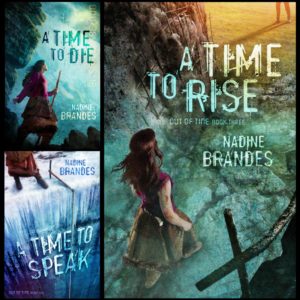Christian Speculative Fiction: What’s Wrong With This Picture?
 The “wrong” I’m referring to in the title is related to the poll I posted a week ago as part of my post “Where Do You Find Your Speculative Fiction?”
The “wrong” I’m referring to in the title is related to the poll I posted a week ago as part of my post “Where Do You Find Your Speculative Fiction?”
While the poll is still live, the results after one week are . . . not what I would hope. First, the number of visitors who participated in the poll is a fraction of those who come to the site. So why didn’t all visitors take part? I can only suppose that they are not particularly interested in the topic.
But this site came into being as a means for readers to discover Christian fiction. Are we failing to connect readers in a meaningful way to the very genre we most want to promote?
Secondly, I was surprised that not more people identified movies and TV as their source of speculative fiction, although many of the “other” comments opted for an “all of these” kind of statement. Still, the results would say that most of those who took part in the poll are reading! I find that encouraging.
Nevertheless, the largest share of the reading pie is going to general market books rather than to Christian speculative fiction.
We did have some good discussion in the comments—special thanks to those who gave more insight through that avenue. Here are a couple things that came up:
1) By “speculative fiction” I’m referring to the umbrella name that’s given to the genres of fantasy, science fiction, and horror. There are many permutations of each of those, too many to list. So the term “speculative fiction” is a type of catch-all that refers to any and all stories that include something of the imaginary based on the unseen world rather than only the imaginary dealing with the seen world.
2) Another comment addressed the quality of Christian speculative fiction. Since I wrote a recent post dealing with that subject, I won’t elaborate here, other than to say, bad fiction outnumbers good fiction, even on the general market side of publishing. Therefore, reading a few titles or authors is not the best way to make an evaluation of an entire genre. I suggest reading the books and titles that are getting wide acclaim. Those aren’t necessarily the books that are most popular!
3) This part of one of the comments piggy-backs on that point: “Unfortunately, as I have discovered, even if people do love the speculative Christian fiction genres, they hardly care to take the time to investigate and discover the authors that aren’t on the top of popularity. Because of this, several Indie and small traditionally published authors go unheard-of.”
People may not be aware of the changes in the publishing industry. Once Christian fiction was not well written, and even when the plots and characters improved, the story still came across as preachy. That’s changed to a large extent. In the same way, once self-publishing was called vanity publishing and authors were paying to get their books in print, often without adequate editing or well-designed covers. But that’s gone the way of the dinosaur, and not the Jurassic World kind. Small publishing companies and self-published books have come about, in part, as a revolt against those who say there is no market for Christian speculative fiction.
But the problem remains: how do those books find their readership?
That’s where reviews come in. And social media. And word of mouth. Those who read books they love need to take the few minutes it takes to write a brief review which they can post on Facebook or Twitter or Amazon (especially Amazon and/or B&N) or Instagram or Goodreads. There are also places where speculative readers hang out—like Spec Faith. Include your reviews here or at our sister site, Lorehaven, which happens to be dedicated to reviews of the best speculative titles written by Christians.
 4) One last observation: many of the authors and titles that came up in the comments are . . . old. Or older. I think it’s fine to read Chesterton or MacDonald or O’Connor, but if Christian speculative fiction can have the impact on culture that I think it can, we need to be reading what’s coming out today. Who’s read Paul Regnier (science fiction) or Emily Golus (young adult fantasy) or Nadine Brandes (dystopian)? More importantly, who’s writing reviews and letting people know on social media sites what books they ought to be reading?
4) One last observation: many of the authors and titles that came up in the comments are . . . old. Or older. I think it’s fine to read Chesterton or MacDonald or O’Connor, but if Christian speculative fiction can have the impact on culture that I think it can, we need to be reading what’s coming out today. Who’s read Paul Regnier (science fiction) or Emily Golus (young adult fantasy) or Nadine Brandes (dystopian)? More importantly, who’s writing reviews and letting people know on social media sites what books they ought to be reading?
That, I think, is the only way Christian speculative fiction will be discovered.










































I have no idea how to answer this question. I PREFER Christian speculative fiction, but I also read mainstream and small publishers. I usually find them by someone (a blog, this blog, etc.) mentioning it or the suggestion feature on Amazon.
Dawn, you have demonstrated why it’s so important for us to write reviews and make recommendations! And I’ll be honest, I don’t intentionally read Christian speculative fiction exclusively. I like reading in other genres from time to time, and if someone recommends a general market book, I have no problem reading those if I have confidence in the person who recommended it. I don’t just grab anything some random person suggests, but if it’s from a trusted source, then yes, that helps me decide.
Becky
Thanks for sharing the poll results Rebecca. I was curious how it would pan out (I felt kind of an ‘all of the above’ reader). It reminds me of a commitment though: I told myself that if I asked for reviews and engagement from my readers, I have to, HAVE TO, reciprocate and do the same for others. So that means taking the time to go to BookBub, and Amazon, and Goodreads, and leave feedback. And try to mention it on social media. And support other authors when they launch. I shouldn’t expect help if I’m not willing to help myself. [Break – I’m fully behind an unconditional love approach too!]
Excellent points, Travis. I think we believers may have been slow to come to this realization. We are much stronger in our ability to get the word out about good Christian storytelling if we do it together.
Becky
Interesting results. I think we need a site that would help bring to light some of the best books that are coming out. Thank you for helping to do that! As I mentioned on the Realm Makers Consortium, I sell my books at homeschool conventions and I can tell you, there is a hunger from both students and parents for exciting sci-fi/fantasy books that have Christian themes woven into them. We just need to connect the readers to the books!
I had a conversation with someone else about this the other day. Homeschoolers love spec fic, but their parents are often picky about language and content. This is a great niche market for Christian spec fic writers.
Most sci fi books I buy these days are by indie authors (small press or self-pub). I just like what I find there. A lot of them are Christian authors who are telling interesting stories that aren’t overtly Christian.
I almost selected spec fic by small presses, but then realized that TV and movies was an option. In order to be honest, I had to select that one, because if I look at the amount of time spent (or the number of stories ingested) then TV and movies wins out.
If your real goal was to discover where people get the spec fic they are READING, I’d leave that TV/movies option off the poll next time.
Also, it’s complicated. Just because I read more small presses doesn’t mean that my favorite spec fic books reside there. Most of my favorites are put out by traditional publishers. I read more small presses, though, because I am motivated to read what my friends are writing, even if it’s not as good a match for my tastes (otherwise, how would I know whether or not I like it?).
By doing this, I have found a few indie authors who match my reading tastes very well, but most of them don’t quite hit the target for me.